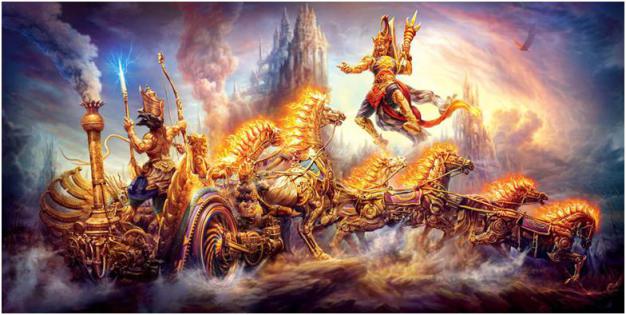The Goals of Life
Purusha and Artha are two very complex Sanskrit words that represent a Hindu ideal of life’s purpose [Purusha (पुरुष) and Artha (अर्थ)]. Together, the words mean purpose of being, the objective of human pursuit, or the meaning of life. Purusha means human being, soul, or the universal principle and soul of the universe. Artha means purpose, objects of desire, or meaning.
The goals of man, the aims of human life, purpose of being, four goals and virtues that lead to a happy life:
- Dharma – Dharma is a key concept in Indian religion that has multiple meanings. Dharma is said to be in harmony with the forces of the cosmos, Brahman, or rta which denotes the “right way” of living. In Buddhism it means “cosmic law and order” and refers to phenomenon and the path and teachings of the buddha. These can be considered virtues.
- Artha – can be defined as the means of life, sense, purpose, meaning, goal, or essence. Essentially, it is the activities or resources required to live in the desired state for the individual. How you make a living and feed yourself.
- Kama – means desire, wish, or longing in Hinduism. Kama most often denotes a sexual desire, but also can mean longing for pleasure, desires, wishes, passions, aesthetic enjoyment of life, affection, or love with or without sexual connotations. This goals are considered healthy and essential when balanced with the other three goals.
- Moksha – means emancipation, liberation, or release more specifically from Samsara and the Maya of this world. It connotes self-realization, self-knowledge, and ultimate freedom.
Together, these form the goals of human life according to the Hindu tradition, however these aspects need to be balanced. Together these turn the wheel that leads towards Moksha, or liberation from the cycles of death and rebirth, ultimately suffering.
It’s nice to think about life as having a need to balance between different pursuits. Too much focus on one, and you become imbalanced and therefore unhappy.
The Hindu traditions recognize certain necessities in life, that all pleasure cannot be avoided. Very different from the Puritan influenced american spiritual traditions such as the quakers or amish. There are nights of indulgence, days of fasting, all kinds of different traditions to allow the body to fluctuate and process the world in the way that it tends to do naturally rather than forcing it to do things in order to conquer the mind. If you are interested in learning more about balancing as your strive forward successfully, Nishkam Karma will be a great guide for you, which is a central message in the Bhagavad Gita.
Hinduism also has answers for those who do understand the tensions between pursuing wealth and virtue simultaneously and provide answers in terms of pursuit with renunciation, craving-free dharma-driven action. In cases of conflict, Dharma is said to be the most important because it leads to Moksha more so than the other two do and Moksha is the main ideal of human life. It is also the foundation for pursuing wealth and sexual pleasure, or whatever it is that you desire.
So this is a method for you to go after the things that you want in life, granted that you remain detached from the end states, because desire for an “end-state” or “product” will only lead to suffering because such things are temporary. Remember that you are a process, that you are happening, right now, processing the world around you in various different ways that you couldn’t possibly be aware of. So enjoy the ride, as they say.

